The Madras High Court disposed of a Public Interest Litigation (PIL) filed to strictly implement the rules prescribed under the policy formulated by the National Transport Development Policy Committee (NTDPC) with respect to parking of vehicles in public spaces in the City of Chennai.
The petitioner also seeks directions against the respondents to formulate rules to enable local bodies/authorities to enforce action against vehicles and owners of such vehicles parked illegally on public spaces apart from charging penalties.
The Additional Secretary to Government, Housing and Urban Development Department, has filed a status report.
The affidavit states that the Greater Chennai Corporation has prepared a draft parking policy and a meeting was held on 3.4.2023 under the Chairmanship of the Chief Secretary to Government with the stakeholder departments and various decisions, as enumerated therein, are taken.
It is further submitted that the Chennai Unified Metropolitan Transport Authority (CUMTA) is directed to prepare the parking policy for Chennai Metropolitan Area. The CUMTA prepared a draft parking policy for the Chennai Metropolitan Area and the said draft parking policy was presented in the meeting held on 11.3.2024 and the policy with incorporated suggestions has been submitted to the Housing and Urban Development Department for approval. The same has been circulated to other departments and after their remarks are obtained, the draft parking policy would be finalised and orders in circulation would be obtained.
The State Government Pleader submits that the said draft parking policy will be finalised within a period of three months from today. The statement was accepted by the Division Bench of Chief Justice Sanjay V. Gangapurwala and Justice J. Sathya Narayana Prasad.
The Court expected that after the parking policy is evolved, the same would be implemented stricto sensu so as to avoid inconvenience caused to the general public.In case there is unreasonable delay in formulating the policy, then the petitioner may agitate afresh.


